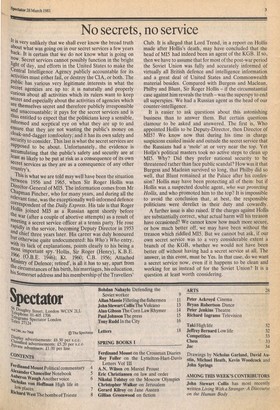No secrets, no service
It is very unlikely that we shall ever know the broad truth about what was going on in our secret services a few years back. It is certain that we do not know what is going on 11,0mi. Secret services cannot possibly function in the bright light of day, and efforts in the United States to make the Central Intelligence Agency publicly accountable for its activities must either fail, or destroy the CIA, or both. The Public has various very legitimate interests in what the secret agencies are up to; it is naturally and properly curious about all activities which its rulers want to keep secret and especially about the activities of agencies which are themselves secret and therefore publicly irresponsible and unaccountable; it pays for the secret services and is t,has entitled to expect that the politicians keep a sensible, informed and sceptical eye on what they are up to and ensure that they are not wasting the public's money on cloak-and-dagger tomfoolery; and it has its own safety and security to consider. This last is what the secret services are supposed to be about. Unfortunately, the evidence is ,accomulating that the public's safety and security are at least as likely to be put at risk as a consequence of its own secret services as they are as a consequence of any other Wirotry's. This is what we are told may well have been the situation be.tween 1956 and 1965, when Sir Roger Hollis was Director-General of MI5. The information comes from Mr ChaPman Pincher, who for many years, and during all the relevant time, was the exceptionally well-informed defence .?rrespondent of the Daily Express. His tale is that Roger mills joined MIS as a Russian agent shortly before the war (after a couple of abortive attempts) as a result of riletlitg a secret service officer at a tennis party. He rose rapidly in the service, becoming Deputy Director in 1953 !nd chief three years later. His career was duly honoured u',It otherwise quite undocumented: his Who's Who entry, with its lack of explanations, points clearly to his being a hiost important spy. 'Hollis, Sir Roger (Henry), K.B.E. xx19.66 -146); Kt. 1960; C.B. 1956; Attached .7nisrry of Defence; retired', is all it has to say, apart from ,m.e circumstances of his birth, his marriages, his education, Ins Somerset address and his membership of the Travellers'
Club. It is alleged that Lord Trend, in a report on Hollis made after Hollis's death, may have concluded that the head of MI5 had indeed been an agent of the KGB. If so, then we have to assume that for most of the post-war period the Soviet Union was fully and accurately informed of virtually all British defence and intelligence information and a great deal of United States and Commonwealth material besides. Compared with Burgess and Maclean, Philby and Blunt, Sir Roger Hollis — if the circumstantial case against him reveals the truth — was the superspy to end all superspies. We had a Russian agent as the head of our counter-intelligence.
It is easier to ask questions about this. astonishing business than to answer them. But certain questions clamour to be asked and answered. The first is, Who appointed Hollis to be Deputy-Director, then Director of MI5? We know now that during his time in charge suspicions existed inside and outside the secret service that the Russians had a 'mole' at or very near the top. Yet Hollis's political masters took no active steps to clean up MI5. Why? Did they prefer national security to be threatened rather than face public scandal? How was it that Burgess and Maclean survived so long, that Philby did so well, that Blunt remained at the Palace after his confessibn? Hollis may have been protecting all of them: but if Hollis was a suspected double agent, who was protecting Hollis, and who promoted him to the top? It is impossible to avoid the conclusion that, at best, the responsible politicians were derelict in their duty and cowardly.
A further issue is also raised. If the charges against Hollis are substantially correct, what actual harm will his treason have occasioned? We cannot know how much more secure, or how much better off, we may have been without the treason which riddled MI5. But we cannot but ask, if our own secret service was to a very considerable extent a branch of the KGB, whether we would not have been better off without having had a secret service at all. The answer, in this event, must be Yes. In that case, do we want a secret service now, even if it happens to be clean and working for us instead of for the Soviet Union? It is a question at least worth considering.










































 Previous page
Previous page